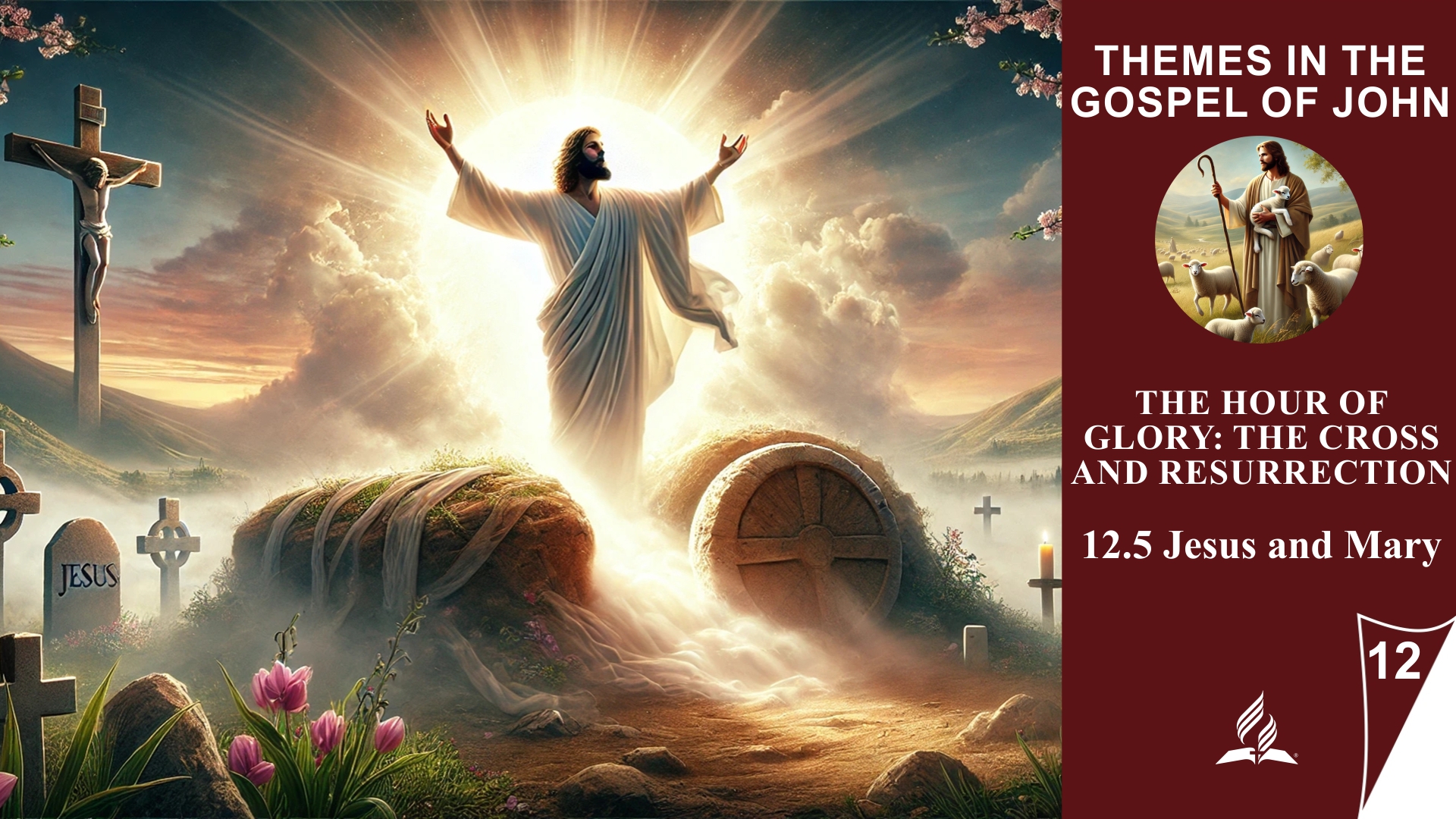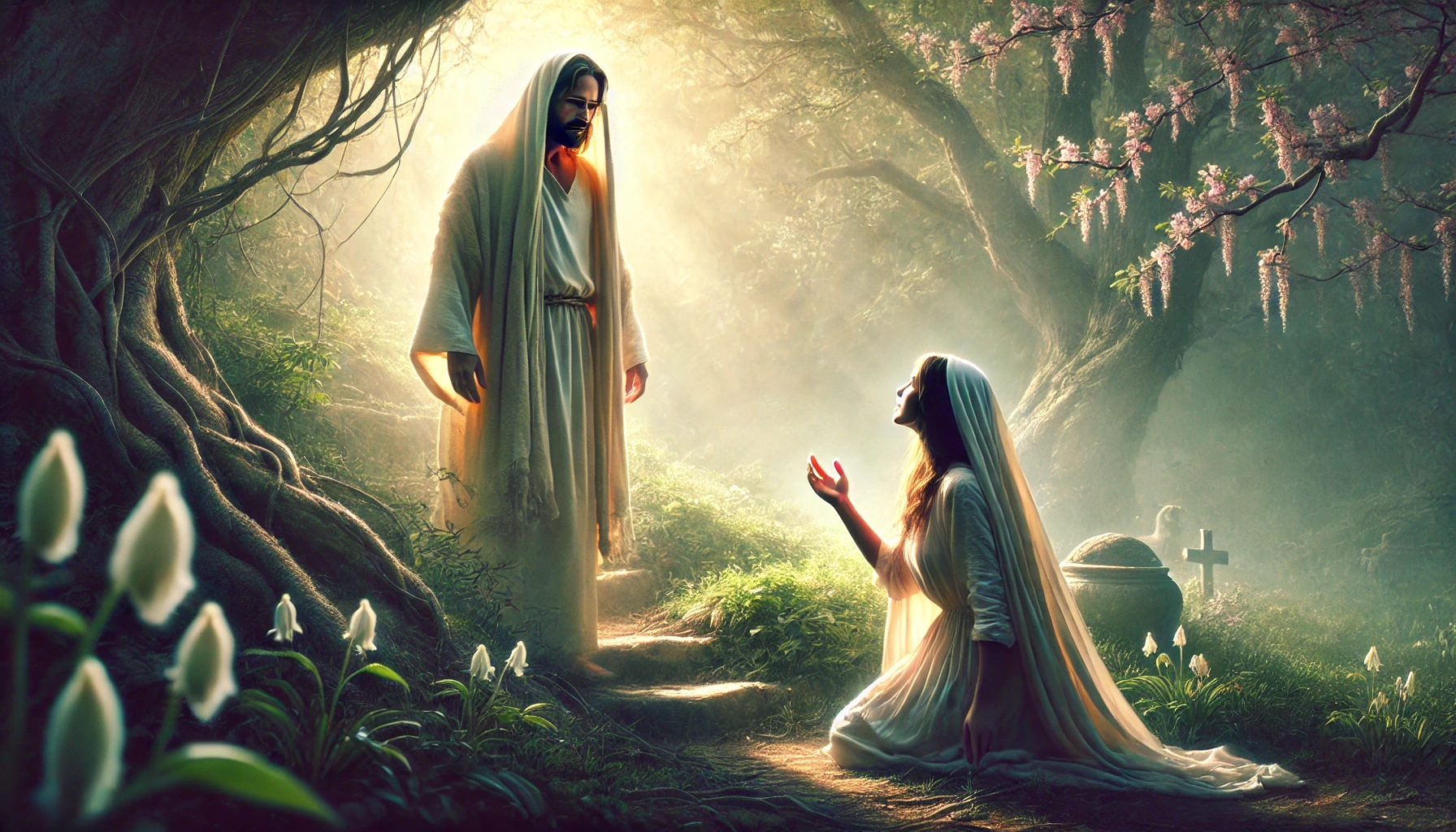


12.5 Jesus and Mary
A Personal Revelation: Mary Recognizes the Risen Lord
Read John 20:11–13. What happened that shows why Mary Magdalene still did not understand the significance of the empty tomb?
Mary Magdalene’s reaction in John 20:11–13 shows how deep her grief and despair were. Although she saw the empty tomb and even encountered angels, she did not yet understand its significance. Her reaction teaches us several important lessons about faith and encountering the Risen One:
-
Pain Clouds Perspective
Mary’s tears and her pain over Jesus’ loss caused her to overlook the obvious signs of the resurrection. She saw the empty tomb, the angels, and heard their question, but her focus was still on the loss.
-
-
Lesson for Us: Pain and sorrow can obscure our vision of God’s workings. In moments of despair, we can trust that God sees us and will reveal His plan at the right time.
-
-
Encounter Without Recognition
Mary saw the angels but did not recognize them as God’s messengers because her heart was fixed on her grief. She was seeking Jesus as she knew Him and could not yet imagine that He had risen.
-
-
Lesson for Us: God often meets us in unexpected ways in our lives. We should be ready to recognize Him in new and unforeseen situations.
-
-
Human Longing for Jesus
Mary says, “They have taken my Lord away.” Despite her despair and misunderstanding, her love for Jesus remains unwavering. Her sorrow shows her deep relationship with Him and her longing to be with Him.
-
-
Lesson for Us: Mary’s longing for Jesus reminds us of how central our relationship with Him is to our faith. Even in times of confusion and doubt, we can seek Him and trust in Him.
-
-
Waiting in Faith
While Peter and John return to the house, Mary remains at the tomb and stays there weeping. Her patience and lingering demonstrate that she does not run away from her pain but brings it before God.
-
-
Lesson for Us: In faith, we often need to practice patience and hold on to God’s presence, even when we do not immediately find answers or comfort.
-
Conclusion
Mary Magdalene’s encounter with the empty tomb shows that faith and understanding are often a process. Her grief initially concealed the truth, but her love and longing ultimately led her to encounter the Risen One. For us, this is an invitation to remain patient in times of sorrow and confusion and to trust that Jesus will reveal Himself to us—often in moments we least expect.
Read John 20:14–18. What changed for Mary?
Mary’s encounter with the risen Jesus in John 20:14–18 is a deeply moving moment that not only changed her life but also the course of human history. In an instant, her grief transforms into joy, her confusion into clarity, and her despair into hope.
-
The Personal Encounter with Jesus
The decisive event is that Jesus addresses Mary by her name. This single word—”Mary”—breaks through her grief and makes her realize that the Lord lives. It is a personal revelation that shows Jesus knows and loves her.
-
-
Lesson for Us: Jesus meets us personally, calls us by name, and knows our desires and struggles. His love for us is individual and profound.
-
-
From Despair to Joy
Mary was overwhelmed by pain and sorrow. But when she realizes that Jesus is alive, her grief turns into indescribable joy. She sees that death is not the end and that her hope in Jesus was not in vain.
-
-
Lesson for Us: In Jesus, we have the assurance that even the darkest moments can be transformed into joy. The Risen Lord gives us hope that overcomes any despair.
-
-
A New Mission
Jesus gives Mary the task of proclaiming the good news of His resurrection: “Go to my brothers and tell them…” (John 20:17). She becomes the first witness of the resurrection and the messenger of the Gospel.
-
-
Lesson for Us: Everyone who encounters Jesus is called to share this message. We are invited to be witnesses of the resurrection and to share the hope we have in Christ with others.
-
-
A New Relationship
Jesus reveals that He is ascending “to my Father and your Father and to my God and your God.” These words emphasize the new relationship made possible through His resurrection: God is now not only Jesus’ Father but also our Father.
-
-
Lesson for Us: Through Jesus’ victory over death, we are granted a deep and personal relationship with God as our Father. This gives our faith a new dimension of closeness and trust.
-
-
A Changed Perspective
For Mary, realizing that Jesus is alive completely changed her perspective. The empty tomb was no longer a sign of loss but a sign of life and hope.
-
-
Lesson for Us: When we recognize that Jesus lives, our perspective changes. Death is defeated, and we can live our lives in the assurance that God’s power is greater than any darkness.
-
Conclusion
Mary Magdalene’s encounter with Jesus shows that the Risen Lord speaks to us personally, transforms our grief into joy, and gives us a new mission and relationship with God. Her story reminds us that Jesus sees us, knows us, and includes us in His work of hope and redemption. This encounter calls us to live this joy and hope in our daily lives and to share it with others.
Read 1 Corinthians 15:12–20. According to Paul, what is the use of our Christian faith if Christ had not been raised?
In 1 Corinthians 15:12–20, Paul emphasizes the central importance of Jesus’ resurrection for the Christian faith. He makes it clear that without the resurrection, our faith would be meaningless, as the entire hope of the Gospel relies on it.
-
Without Resurrection, Our Faith is Futile
-
-
Paul writes: “But if it is preached that Christ has been raised from the dead, how can some of you say that there is no resurrection of the dead?” (v. 12). Without the resurrection, there would be no foundation for our message or our faith.
-
Meaning: Faith in Christ is not just moral or philosophical but is based on the historical event of the resurrection. Without it, there is no hope for redemption and new life.
-
-
We Would Still Be in Our Sins
-
-
Paul explains: “But if Christ has not been raised, your faith is futile; you are still in your sins” (v. 17). The resurrection confirms that Jesus’ sacrifice on the cross was effective and brought victory over sin.
-
Meaning: Without the resurrection, there would be no forgiveness and reconciliation with God. We would remain separated from Him by our guilt.
-
-
Our Hope Would Be Empty
-
-
Paul writes: “If we have hope only in this life, we are of all people most to be pitied” (v. 19). Without the resurrection, there would be no hope beyond this life.
-
Meaning: Faith in Jesus brings not only comfort for earthly life but also hope for eternal life. Without the resurrection, this hope would be an illusion.
-
-
The Resurrection as the Foundation of Our Faith
-
-
Paul testifies: “But Christ has indeed been raised from the dead, the firstfruits of those who have fallen asleep” (v. 20). The resurrection is proof that death is not the end and that we will also be raised one day.
-
Meaning: Jesus’ resurrection is the cornerstone of the Christian faith. It not only offers forgiveness and reconciliation but also the hope of new life and eternal communion with God.
-
Conclusion
Without Jesus’ resurrection, the Christian faith would be meaningless, the forgiveness of sins impossible, and the hope of eternal life nonexistent. However, Paul affirms that Christ has indeed been raised, providing our faith with an unshakable foundation. The resurrection is proof of God’s faithfulness and power, assuring us that our lives and our faith are not in vain. Through Jesus’ resurrection, we have a living hope that transcends this life.
Mary Magdalene’s encounter with the risen Jesus shows how much faith, hope, and a personal relationship with Jesus can transform our lives and daily experiences.
-
Jesus Sees Us in Our Grief
Mary was in deep despair and did not notice that Jesus was already with her. It was only when He called her by name that she recognized Him.
-
-
Connection to Daily Life: In our darkest moments, when we feel alone and lost, Jesus is with us. He knows us personally and speaks to us. This realization can bring us comfort and peace, even in difficult times.
-
-
Faith Changes Our Perspective
Initially, Mary saw only loss and death in the empty tomb. But her encounter with Jesus changed everything: her pain turned to joy, her confusion to certainty, and she received a new perspective.
-
-
Connection to Daily Life: When we let Jesus into our lives, we can find new hope and clarity in seemingly hopeless situations. Our perspective changes because we know that God can bring light into darkness.
-
-
A Personal Relationship with Jesus
When Jesus called Mary by name, she recognized Him. This personal revelation transformed her life and gave her deep joy and assurance.
-
-
Connection to Daily Life: Our faith is not an anonymous religion but a personal relationship with a living God. Jesus knows each of us by name, understands our struggles, and invites us to trust Him.
-
-
A New Mission
Jesus gives Mary the task of proclaiming the good news of His resurrection. She becomes the first witness of the resurrection and shares the hope with the disciples.
-
-
Connection to Daily Life: Each of us is invited to carry this hope into the world—through our words, actions, and lives. We can convey to others the joy and hope we have found in Christ.
-
-
A New Relationship with God
Jesus reveals that God is not only His Father but also our Father. The resurrection opens a new dimension of our relationship with God as our loving Father.
-
-
Connection to Daily Life: This close relationship with God gives us strength, comfort, and trust in every situation. It reminds us that we are never alone and always have access to God.
-
Conclusion
Mary Magdalene’s encounter with Jesus shows us that faith changes our lives—it moves us from sorrow to joy, from confusion to clarity, and from loneliness to deep communion with God. This story invites us to seek Jesus in our daily lives, trust Him, and share the hope of the resurrection with others. In every life situation, Jesus is near—He calls us by name and gives us new courage and perspectives.

Jesus calls us by name, transforms our grief into joy, and gives us hope that transcends death.
(Visited 28 times, 1 visits today)






















